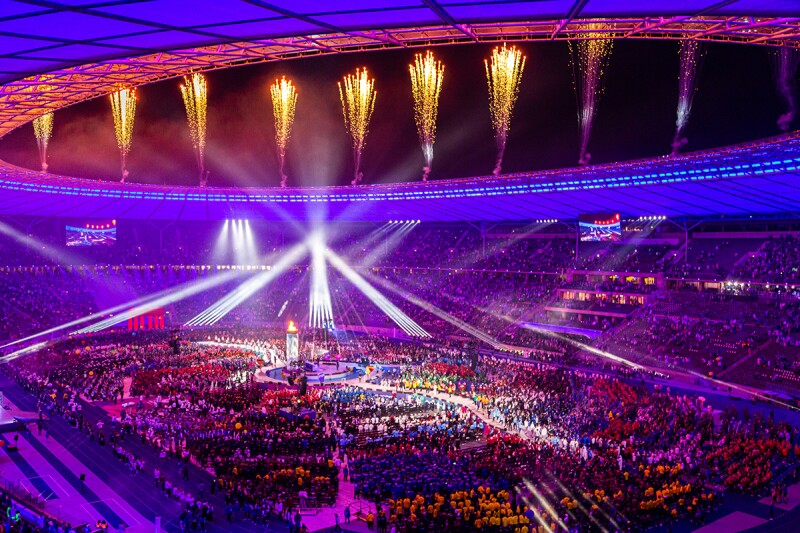2023 marked a momentous year, as the Special Olympics movement’s flagship event—the World Games—were held for the first time in four years. The 2023 Special Olympics World Games took place from 17 – 25 June in Berlin, Germany, welcoming nearly 7,000 athletes and Unified teammates (athletes without intellectual disabilities) from 176 nations. They were joined by 3,000 coaches and 18,000 volunteers, who worked tirelessly to ensure the event was a success. A record-breaking 1,800 international media and sports journalists representing 90 countries were in Berlin to cover the Games, while 330,000 spectators turned out to cheer on the athletes and enjoy the high-quality sporting competition.
The 2023 Games in Berlin boasted record-breaking numbers and several notable firsts. The percentage of female athletes participating in the Games rose to its highest level ever: 48.1%, a 10.7% increase compared to the 2011 World Games. The sports team overseeing competition and events was also the most inclusive yet, with 51 sport officials and an assistant technical delegate with intellectual disabilities working to support the Games.
International sports organization were out in force at the Games with 46 representatives from 17 sports organizations, including five International Olympic Committee members and the International Paralympic Committee’s president, Andrew Parsons. Four new partnerships with international federations representing hockey, table tennis, volleyball and cycling were launched at the Games, helping to deliver on a legacy goal to improve the quality and reach of Special Olympics programming at a local, national, regional, and international level.
Robust ticket sales, both for competition events and the Opening Ceremony, were also recorded: with 110,000 tickets sold for individual competitions, and an additional 50,000 tickets for Opening Ceremony.
One of the key legacy objectives of the Berlin Games was the improvement of the reach and impact of Special Olympics Germany and the development of more inclusive communities throughout the country. Following the Games, 28 Special Olympics youth leaders and nine athlete leaders are now involved in projects to activate inclusive communities in their localities. In addition, 50 Unified Sports experts—trained at the Games—are engaged in the delivery of ongoing high-quality competitions.
The Special Olympics Young Athletes program was launched in Germany for the first time at the Games. An early childhood play program for children with and without intellectual disabilities, Young Athletes engages children from ages 2 to 7 years old and their families. Special Olympics Germany will be delivering a series of Young Athletes Sports Days, in collaboration with regional associations, over the coming years to expand the program.
Overall, the social impact of the Berlin Games delivered a great boost to awareness of and engagement with Special Olympics. A key legacy objective for the Berlin Games was the positive transformation of attitudes towards those with intellectual disabilities. In Berlin, post-event research shows that the levels of public awareness for Special Olympics grew by 10% compared with before the Games. Across Germany that figure is even higher, with research and evaluation revealing that the levels of recognition for the movement rose by 24%. More than half of those who saw coverage of the Games reported that it had made them more respectful of the achievements of people with intellectual disabilities in everyday life.
This growth was helped by robust media coverage with a historic alliance of 11 of the largest sport reporting media companies in Germany coming together to function as one host broadcaster for the Games. They worked with official Global Broadcaster ESPN to make available 400 hours of live and sports highlight coverage. ESPN platforms also aired content in 13 global markets, with 23 syndicated partners signing up to receive full or partial coverage, while delivering 500 hours of coverage in the United States.
In Europe, a new initiative saw the establishment of the European Media Broadcast Unit. This team of 12 reporters, camera operators and editors delivered more than 800 customized sport news highlights packages featuring each of the 56 delegations from across the Europe Eurasia region. The European Broadcast Union (EBU) also reached an agreement for selected EBU members to show coverage. Under the terms of a multilateral agreement, which included ESPN and the Berlin 2023 Organizing Committee, more than 20 national broadcasters and media outlets across the Europe Eurasia region agreed to deals to take coverage from the Games.
More than 15,000 free health screenings were conducted at the Berlin Games as part of Special Olympics Healthy Athletes®, which is the world's largest inclusive health program focused on the needs of people with intellectual disabilities. Thousands of athletes returned home from the Berlin Games after being fitted with equipment like hearing aids, glasses, and properly fitting shoes—things critical to sports and life.
Meanwhile, on the sidelines of the Special Olympics World Games in Berlin, countries and organizations came together to launch the first-ever Global Leadership Coalition for Inclusion. The Special Olympics Global Leadership Coalition, which recommends that at least 3% of every nation’s education budget be spent on inclusive education, was increased to 15 countries during the Berlin Games. In total, 60 ministers and government officials attended the Games.








